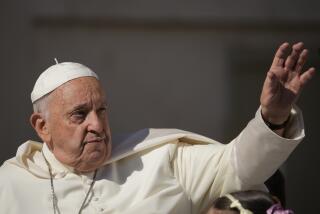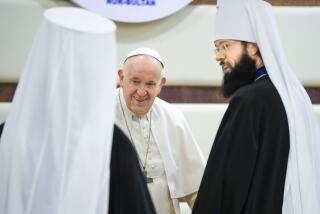Gorbachev in Rome: Fun and Profit and a Chat With Pontiff : Italy: The Soviet leader gets an enthusiastic welcome and invites a papal visit. He is offered economic aid.
- Share via
ROME — Better loved in Rome than in Moscow, Soviet President Mikhail S. Gorbachev swept triumphantly through the Eternal City on Sunday for the second time in less than a year, swapping compliments with the Pope, shaking hands with well-wishers in the street, accepting generous aid from an adoring Italian government and departing nearly half a million dollars richer himself.
For Gorbachev and his chicly attired wife, Raisa, Italy represented nine hours of substance, fun and profit in from the cold; an interlude between tensions in the fraying Soviet Union, and a 34-nation European summit in Paris to write finis to a Cold War that the Soviets lost.
On a day stalked by the specter of a shooting war in the Persian Gulf, Gorbachev and Pope John Paul II and the Italian government all called anew Sunday for a negotiated settlement.
“I am convinced we will find a way out of this profound crisis. There are new ideas to pursue, and we are starting toward the search for a solution for this grave crisis which involves all of us,” Gorbachev told Italian leaders without public elaboration. A Soviet spokesman said Gorbachev considers that the United Nations “still has the chance to increase the pressure on (Iraqi President) Saddam Hussein.”
In a prayer to 20,000 pilgrims in St. Peter’s Square before receiving Gorbachev, John Paul called for every effort to avoid war in the gulf and for the release of hostages there. “May merciful God . . . spare humanity the horrors of a new conflict,” he said.
Gorbachev found an Italian echo for his go-slow stand at a meeting with Prime Minister Giulio Andreotti. “One cannot be resigned to the need to resort to force unless absolutely necessary,” Andreotti’s spokesman, Pio Mastrobuoni, quoted the Italian leader as saying.
If the matters of state were sometimes weighty Sunday, Gorbachev’s good mood was unmistakable. On a hazy day that was chilly by Roman, if not Muscovite, standards, the Soviet leader rode with the bulletproof window of his limousine down, smiling and waving for miles at bystanders behind police barricades.
Near the Piazza Navona, Gorbachev halted his motorcade and sprang out to shake Roman hands. At the Vatican, he bantered with John Paul before and after a 40-minute summit-of-Slavs whose relaxed atmosphere was light years from the strained formality of their historic first encounter last Dec. 1.
“Busy today, eh?” the black-suited Gorbachev teased the white-robed Pope, who had finished noonday prayers from his balcony a few minutes before. “My wife has things to do,” Gorbachev said as Raisa, in a gray suit over a burgundy blouse with a bow at her neck rose after a few minutes to leave the two leaders alone. She visited the Vatican Museum while they talked.
At the Vatican, Gorbachev reiterated an invitation for a papal visit to the Soviet Union that he extended at their first encounter. “I think our next meeting will be in our country. We talked about it today,” Gorbachev told Soviet reporters as he emerged from the papal library.
The Vatican remained officially noncommittal, saying that it was still trying to establish what part of the church in the Soviet Union had survived decades of official suppression. It will surprise no one, though, if the Pope journeys to Moscow in 1992.
“The right moment will come,” John Paul told reporters during a tour of Roman parishes after his meeting with the Soviet leader. Vatican spokesman Joaquin Navarro said the “open and very friendly” conversation through interpreters ranged across issues of mutual concern from the re-establishment of religious freedom in the Soviet Union to the Persian Gulf.
At meetings with President Francesco Cossiga and Andreotti, Gorbachev signed a 20-year Soviet-Italian friendship treaty that includes a nonaggression clause. And, he won pledges of up to $5 billion in economic aid--loans guaranteed by the Italian government--over the next five years.
To cap his day, Gorbachev accepted a $450,000 human rights prize sponsored by Italy’s Fiuggi Foundation. Andreotti is a member of the jury for the award, which is sponsored by a company whose mineral water is renowned in Italian folklore for its supposed ability to dissolve kidney stones.
More to Read
Sign up for Essential California
The most important California stories and recommendations in your inbox every morning.
You may occasionally receive promotional content from the Los Angeles Times.










